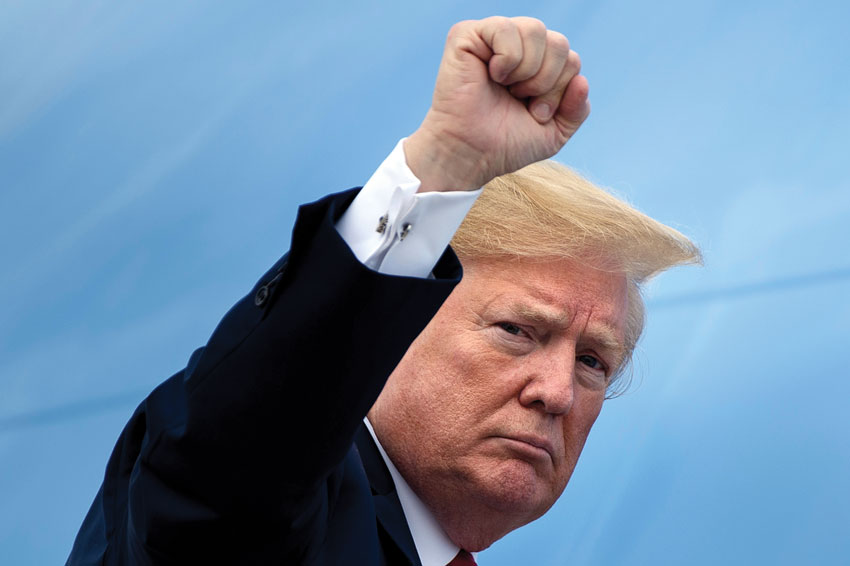U.S. Silent on Reason for Postponement of 2+2 Dialog
President Donald Trump, traveling to North Dakota, boards Air Force One at Andrews Air Force Base June 27, in Maryland. (Brendan Smialowski/AFP/Getty Images)
The U.S. did not spell out the “unavoidable reasons,” June 28, that forced the postponement of the first 2+2 dialog with India again, a development that India watchers here say was “unfortunate” and “more than a little embarrassing” for the Trump administration, writes Lalit K. Jha.
One observer noted that President Donald Trump’s preoccupation with Russia could have led to the postponement.
External Affairs Minister Sushma Swaraj and Defense Minister Nirmala Sitharaman were to travel to Washington to take part in the meeting with Secretary of State Michael R. Pompeo and Secretary of Defense James Mattis on July 6.
This new dialog format was agreed upon between the two sides during the visit of Prime Minister Narendra Modi to Washington in June 2017. It was seen as a vehicle to elevate the strategic relationship between the two countries with special focus on bolstering strategic, security, and defense cooperation.
Safe to say that U.S.-India relations have taken their “biggest tumble” in quite some time, tweeted Michael Kugelman from the Wilson Center.
“In the Trump era, no U.S. relationship is foolproof,” he said. “This is really big. 2+2 could have been used to reset a relationship experiencing growing tensions on the econ side,” he said in another tweet.
A State Department spokesperson told PTI that External Affairs Minister Swaraj and her American counterpart Pompeo during a phone call on June 27, agreed to reschedule the 2+2 dialog as soon as possible at a mutually convenient time and location.
Pompeo spoke over phone with Swaraj on June 27 to discuss further strengthening U.S.-India cooperation. Pompeo conveyed to Swaraj “his regret at the postponement” of the 2+2 dialog previously scheduled to take place on July 6, the spokesperson said.
“The Secretary and Minister Swaraj agreed the 2+2 dialog would be rescheduled as soon as possible at a mutually convenient time and location,” the State Department spokesperson said, hours after Ministry of External Affairs spokesperson Raveesh Kumar tweeted that during the call Pompeo expressed his “regret and deep disappointment” at the US having to postpone the 2+2 Dialog for “unavoidable reasons.”
Without explaining the “unavoidable reasons,” the State Department Spokesperson asserted that the U.S.-India relationship was “a major priority” for the Trump administration, and it looks forward to continuing to strengthen the partnership.
The postponement of the 2+2 talks is “unfortunate and more than a little embarrassing for the United States,” said Joshua T White, a former Obama administration official.
“But frankly I’m more worried that the growing cascade of disputes surrounding trade and investment will slowly sap momentum from this very important relationship,” White, currently a fellow at the Edwin O Reischauer Center for East Asia Studies at The Johns Hopkins University School of Advanced International Studies in Washington, told PTI.
After June last year, the two countries have tried to schedule the dialog many times with several dates having been considered.
Earlier this year also, the ‘2+2 dialog’ had been postponed due to uncertainty over the confirmation of Pompeo as President Donald Trump’s new Secretary of State. Pompeo was confirmed as Secretary of State in April.
The State Department spokesperson noted that “India’s central role in U.S. national security is enshrined in the President’s National Security Strategy, which noted that “We welcome India’s emergence as a leading global power and stronger strategic and defense partner.”
The spokesperson noted that U.S. Ambassador to the UN, Nikki Haley, is in New Delhi right now for a visit focused on advancing the U.S.-India relationship.
The postponement of the 2+2 dialog comes in the backdrop of India’s plan to purchase the S-400 missile defense system from Russia, which was expected to be among the topics up for discussion.
The U.S. passed the Countering America’s Adversaries Through Sanctions Act (CAATSA) against Russia in August 2017 for reportedly influencing and manipulating the 2016 presidential election process. India wants its defense deals with Russia outside the purview of the CAATSA.
It also came a day after the Trump administration told India and other countries to cut oil imports from Iran to “zero” by November 4 or face sanctions, making it clear that there would be no waivers to anyone.
Bharat Gopalaswamy from the Atlantic Council said it was “not so pleasing” to see the 2+2 being called off.


